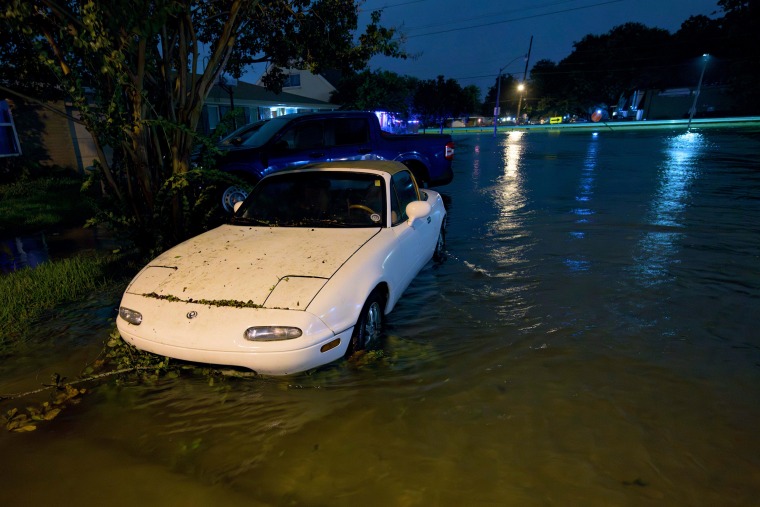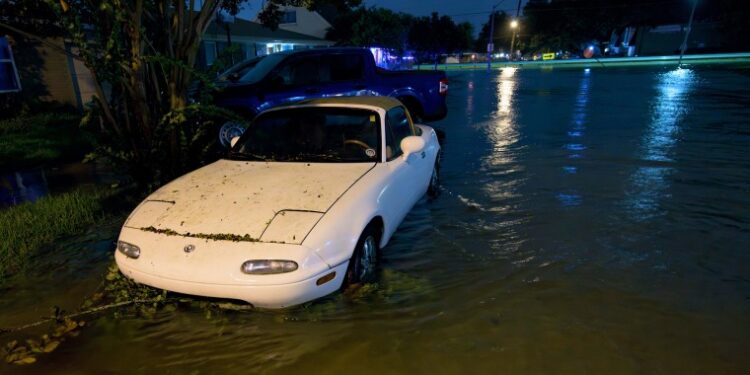Almost all warnings for what had been Category 2 Hurricane Francine were canceled by Thursday night, a day after the storm named slammed into the Louisiana coast with heavy rains and 100-mph winds.
By late Thursday, Francine was a post-tropical cyclone, and flood watches and wind advisories were in effect for portions of the Mississippi Delta, Tennessee Valley and the Southeastern U.S. at 11 p.m. ET, the National Hurricane Center said.
But what did remain in the wake of the storm that made landfall in Terrebonne Parish, Louisiana, was more 150,000 customers without power in the state, according to tracking website poweroutage.us.
Louisiana Gov. Jeff Landry toured the hardest-hit areas across his state Thursday. “Power is the most important thing that we need right now,” he said on NBC’s “Hallie Jackson NOW.”
Landry said he hoped to have power fully restored by Sunday and urged residents to stay off the roads so utility workers could do their jobs.
There have been no reports of deaths related to the storm.
In New Orleans, the din of portable generators was the soundtrack across much of the city Thursday as entire neighborhoods lost power, and streets were blocked by debris and downed oak and cypress trees.

Amid the mayhem, stories began to emerge of ordinary people performing extraordinary exploits to save their neighbors from harm.
A good Samaritan named Miles Crawford smashed a window to rescue a driver from a fully submerged pickup truck that was caught in the floodwaters Wednesday evening beneath the Canal Street underpass in New Orleans, NBC affiliate WDSU reported.
Crawford said he sprang into action after WDSU reporter Jonah Gilmore, who was doing a live shot in the area, spotted the submerged pickup and flagged down a nearby police officer.
“I’m a nurse, so got to save lives, right?” Crawford, who works at the University Medical Center, told The Associated Press.
Packing 100 mph winds, Francine roared ashore in Terrebonne Parish at around 5 p.m. local time as a Category 2 hurricane, battering a fragile coastal section of Louisiana that hasn’t fully recovered from a series of devastating hurricanes in 2020 and 2021.
Moving at a fast clip, Francine barreled into New Orleans, pounding the hard-pressed city with torrential rains and tearing the roofs off hundreds of buildings. The low-lying city was quickly deluged, with 7.33 inches of rain reported at New Orleans International Airport.
In the New Orleans suburb of Kenner, 100 homes were swamped by rainwater. Over in nearby Metairie, floodwaters turned streets into impassable canals.
“Now is not the time to be out on the roads,” Jefferson Parish President Cynthia Lee Sheng warned on X in the midst of the storm. “All residents are urged to stay home.”
In Lafourche Parish in southern Louisiana, 26 people trapped by rising floodwaters were rescued, local officials said.
Some of those affected by power outages may not get electricity back for days.
Utility company Entergy says it may not be able to restore power to 90% of Terrebonne, Lafourche and Assumption parishes until 10 p.m. Monday.
The east bank of Orleans Parish has an estimated restoration time of 10 p.m. Saturday, the company said in a list of expected times released Thursday.
The storm, even though a post-tropical cyclone, was still posing a heavy rainfall threat for parts of northern Mississippi, northeast Arkansas, southwest Kentucky, and western Georgia on Thursday night, and those areas could see up to 4 inches of additional rain, the National Hurricane Center said.
That could be enough to cause considerable flash flooding and urban flooding, the agency warned.








